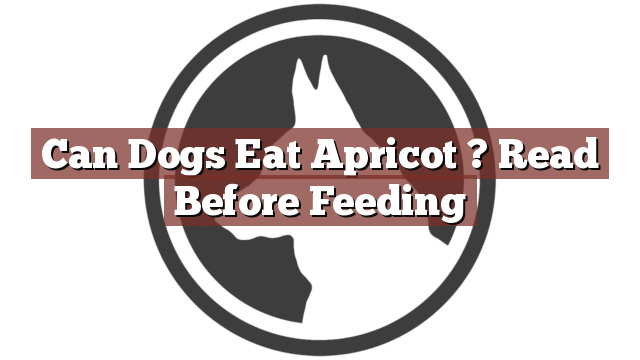Understanding Your Dog’s Dietary Needs
As a responsible pet owner, it is important to understand your dog’s dietary needs. Dogs have specific nutritional requirements that differ from humans, and it is crucial to provide them with a balanced diet to ensure their overall health and well-being. While dogs primarily thrive on a diet of meat and vegetables, it is natural for owners to wonder if they can offer certain fruits to their furry companions. Apricots, with their sweet and juicy flesh, are a popular fruit among humans. However, can dogs eat apricots?
Can Dogs Eat Apricot? Read Before Feeding
Can dogs eat apricots? The answer is yes, but with caution. While apricots are generally safe for dogs to consume, there are a few considerations to keep in mind. Apricots contain a significant amount of vitamins A and C, fiber, and potassium, which can be beneficial for dogs in moderate amounts. However, the pits or seeds of apricots contain cyanide, which is toxic to dogs if ingested. Therefore, it is crucial to remove the pits before offering apricots to your furry friend. Additionally, apricots should only be given to your dog as an occasional treat and not as a substitute for their regular diet.
Pros and Cons of Feeding Apricots to Dogs
Feeding apricots to your dog can have both pros and cons. On the positive side, apricots are a great source of vitamins and fiber which can aid digestion and support a healthy immune system. The high fiber content can also help regulate bowel movements and prevent constipation in dogs. Moreover, the natural sugars in apricots can provide a tasty and healthy alternative to processed treats. However, it is important to note that apricots are also relatively high in sugar. Therefore, if your dog has diabetes or other conditions that require a low-sugar diet, it is best to avoid giving them apricots. Additionally, some dogs may have an allergic reaction to apricots, so it is important to observe your pet for any signs of discomfort or allergies after consuming the fruit.
In Conclusion: Apricots can be a healthy occasional treat for dogs, but moderation and careful preparation are key.
To summarize, dogs can eat apricots in moderation and after proper preparation. Remember to remove the pits before offering apricots to your furry friend, as the seeds contain cyanide and can be hazardous to their health. While apricots can provide valuable vitamins and fiber to your dog, it is important to feed them as an occasional treat and not as a substitute for their regular diet. If your dog has any underlying health conditions or allergies, it is always best to consult with your veterinarian before introducing new foods into their diet. By understanding your dog’s dietary needs and making informed choices, you can ensure that your beloved companion stays healthy and happy.
Thank you for taking the time to read through our exploration of [page_title]. As every dog lover knows, our furry friends have unique dietary needs and responses, often varying from one canine to another. This is why it's paramount to approach any changes in their diet with caution and knowledge.
Before introducing any new treats or making alterations to your dog's diet based on our insights, it's crucial to consult with a veterinarian about [page_title]. Their expertise ensures that the choices you make are well-suited to your particular pet's health and well-being.
Even seemingly harmless foods can sometimes lead to allergic reactions or digestive issues, which is why monitoring your dog after introducing any new food item is essential.
The content provided here on [page_title] is crafted with care, thorough research, and a genuine love for dogs. Nevertheless, it serves as a general guideline and should not be considered a substitute for professional veterinary advice.
Always prioritize the expert insights of your veterinarian, and remember that the health and happiness of your furry companion come first.
May your journey with your pet continue to be filled with joy, love, and safe culinary adventures. Happy reading, and even happier snacking for your canine friend!

